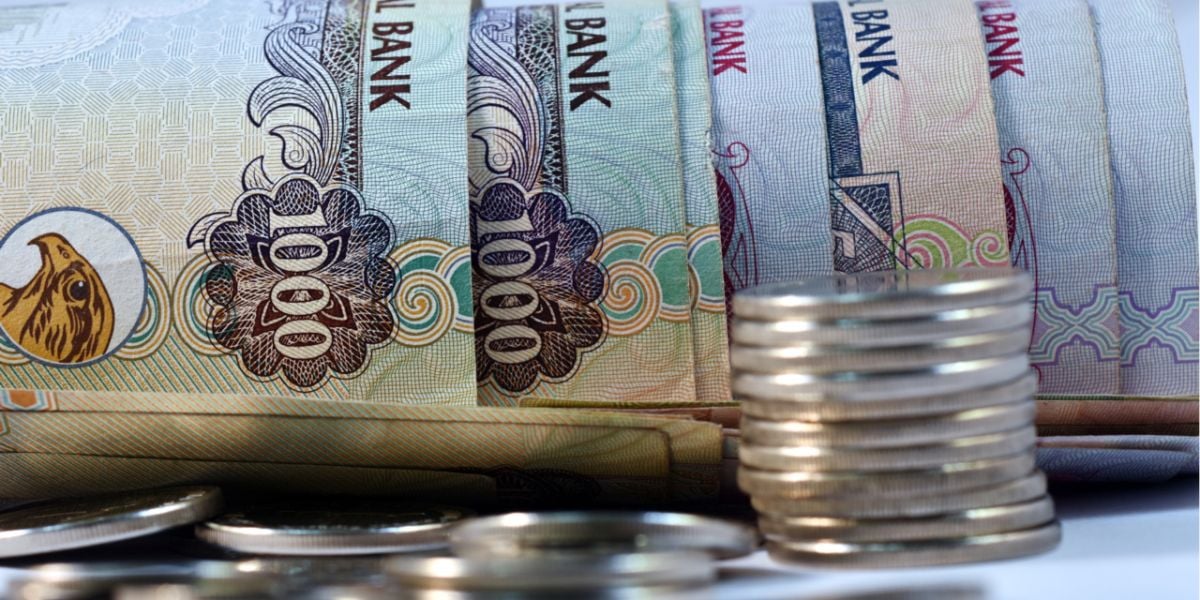
As an expatriate living and working in the United Arab Emirates, you will need a local bank account to receive your monthly salary from your employer or income from your business or freelance activities. It is not complicated to open a bank account anywhere in the UAE. There are just some requirements to follow, one of which is being a legal resident of the country.
Important:
You have to be the holder of a resident visa as proof of your legal presence in the country to be allowed to open a bank account.
How to open a bank account in the UAE
Procedures and requirements vary from one bank to another, so you are advised to seek all relevant information to determine which one suits you best.
If you are an expat resident in the UAE, you should be able to open a bank account within a few days. You will need to provide the following documents:
- passport with the UAE entry stamp (original and copy);
- passport photo;
- completed application form;
- proof that your residency visa or Emirate ID card is being processed;
- a document stating your employer's name as well as your salary details;
- letter of recommendation from your previous bank;
- letter of No Objection from either your sponsor or employer.
If you are not a resident of the UAE, you will only be able to open a savings account. You will also be able to apply for a debit card that you can use to withdraw money from the account. Note that non-resident bank accounts do have minimum and maximum balance limits. To open a savings bank account as a non-resident, you will need to provide the following additional documents:
- Your latest utility bill;
- The most recent bank statement in your home country or another country;
- Documentation describing the source of your funds.
A good tip, if you work in the United Arab Emirates, is to open an account with the same bank that your employer uses. This should facilitate the transfer of your salary as well as other banking transactions.
Opening an account in the UAE remotely
In some cases, you will be able to open a bank account remotely via a smartphone app. More and more banks in the UAE are offering this option:
- Liv Accounts by Emirates NBD – Liv offers a number of different accounts with attractive interest rates;
- Neo by Mashreq Bank – Neo offers a joining bonus based on your transferred salary, which can go up to AED 2,500. You will need a minimum salary of AED 5,000 to open your account;
- YAP by RAK Bank – YAP has no minimum balance requirement and offers virtual cards in place of physical ones;
- CBD Digital Current Account – CBD's digital current account offers 2 free international money transfers per month, a free debit card and checkbook (upon approval);
- Sharjah Islamic Bank Digital Account – SIB's digital account has no minimum balance requirements and offers a free debit card and checkbook.
To open a bank account this way, you will need to download your preferred app, scan your Emirates ID, go through the registration procedure, and top off your account. Your card will then be dropped off at your selected address where applicable.
Personal bank accounts in the UAE
Similar to banks worldwide, there are three main types of personal bank accounts that you can open in the UAE, depending on what your specific needs are.
Current Account
The most common and standard account is the current account. This can be used for your day-to-day financial needs and money transfers and can be used to receive your salary. If you opt for a salaried current account, you will need to ensure that your salary is sent to this account each month. If you opt for a personal current account, the bank will determine how much money needs to come into the account each month. Additional benefits are available for this type of account, depending on the bank you choose to go with.
Savings Account
As the name suggests, people often opt for a savings account to put aside money that they plan to save. These types of accounts usually have more attractive interest rates, but they may also come with limitations on how often you can access your money. This depends on the bank you choose, and the type of savings account you opt for.
Investment Account
Investment accounts generally offer the best interest rates out of the three options. However, they also tend to have the most limitations when it comes to accessing your funds. This could mean that you will not be able to use or withdraw any money from this account over a certain period of time. If you're looking to let your money sit in a bank and grow, this would be a good option.
Choosing a bank account in the UAE
When choosing a bank, you want to work with and the type of account you want to set up, you may also want to consider the following:
With the high percentage of expats in the UAE, you'll find that banks operating in the country are particularly geared towards your needs. Nonetheless, there are a few factors to consider when shopping around for a bank account in the UAE. But before you make that call, ask yourself – and the bank officer – the following questions:
- Required minimum balance;
- Additional fees and when they might need to be paid;
- Local and international transfer requirements;
- Is there a branch of the same bank located close to where you have settled?
- What bank in the area is recommended by your friends and colleagues?
Getting a checkbook in the UAE
Checkbooks might seem outdated in some cases, but they remain essential in the UAE — especially if you're looking to rent a property. Most landlords request that payments be made through cheques and may even request post-dated cheques in the case of multiple payments.
Many banks in the UAE offer free checkbooks upon opening an account with them. If they don't, you can easily request one from the bank through their dedicated app, website, and, in some cases, even an ATM machine. The cost of checkbooks varies between banks and even different accounts, but they are generally around AED 10.
Bank accounts for children in the UAE
More and more people are choosing to open bank accounts for their children. These accounts are sometimes used as savings accounts or even for the child to carry as the world moves more toward contactless payments.
Opening a bank account for your child is relatively easy, and Minor Accounts are offered by most banks in the UAE. While this may vary from bank to bank, the main requirements you will need are:
- The legal guardian's valid Emirates ID, passport, and residency visa;
- The child's valid Emirates ID, passport, and residency visa;
- If the legal guardian is not the child's father, you will be required to obtain a court-notarized guardianship letter.
How to open a corporate bank account in the UAE?
If you want to set up a business in the UAE, you will need to open a commercial bank account. Note that it is illegal to run business operations via a personal bank account in the UAE.
Typically, to open a commercial bank account in the UAE, you will need to present the following documents:
- Your business trade licence and registration certificate;
- Share certificates and company memorandum;
- Board resolution authorising the company to open a bank account;
- ID copies of all shareholders and authorised signatories;
- Your lease agreement.
Note that depending on the specifics of your case, additional documentation may be requested.
Banking services in the UAE
Banking in the UAE is very convenient, especially for expats. Banks have features where you can directly remit to banks abroad, which is an easy way for expats to send money abroad. As there are several banks in the country, you can access your money wherever you are.
There are various banks to choose from as well as different procedures and requirements for each. Bank fees and services may also differ. You are advised to contact the banks directly for more information.
As the UAE is part of the Arab world, you can also benefit from Islamic banking services that are governed by the Shari'a Law. Some of the main benefits of Islamic banking are that there are no interest rates, and no limitations on withdrawing money from investment accounts.
Foreign currency exchange and money remittance are a common practice in the United Arab Emirates. You will, therefore, find currency exchange bureaus in most cities. To send money to your home country, you can use either these currency exchange bureaus or your local bank. If you prefer using the exchange bureaus, you will be asked to produce a copy of your Emirates ID and proof of income.
Mortgages and loans for expats
Most banks across the UAE offer expats the opportunity to apply for car loans, personal loans and home loans (mortgages). It's important to note that interest rates are generally high in the UAE, so you should consider this when choosing your preferred bank. Eligibility and requirements will vary from bank to bank, but we've put together the main points to give you an idea of what you will need for each type of loan.
Car loans
Some banks will offer different types of car loans, such as fixed-rate interest, or special plans for those interested in buying electric, environmentally friendly vehicles. General requirements for obtaining a car loan are:
- Minimum down payment on the car of 20%;
- Completed loan application form;
- Copy of your valid passport and Emirates ID;
- Copy of your valid driving license;
- A quotation from the car dealership.
Additional requirements might be requested if your salary is not deposited in the bank you wish to take a loan from or if you are self-employed. It's best to check the bank for further details.
Personal loans
Similar to car loans, personal loan types, and requirements differ from one bank to the other. However, some of the key common requirements for personal loans are:
- Completed loan application form;
- Having a minimum salary of AED 5,000;
- Your salary must be transferred to the bank you're taking a loan from;
- Copy of your valid passport and Emirates ID;
- Bank statements for the last 3 months.
Home loans
Banks in the UAE will generally offer home loans to expats that cover 80% of the property value. Some banks will allow you to apply with a co-borrower, and the loans are available for both salaried employees as well as self-employed individuals. While requirements may change based on each specific circumstance, the general requirements for a home loan are:
- Completed loan application form;
- Copy of your valid passport and Emirates ID;
- Your latest salary certificate;
- Bank statements for the last 6 months;
- Proof of booked property.
How to close a bank account in the UAE
If you are leaving the UAE and your residence visa is cancelled, you will have a grace period of 6 months to deal with all the formalities. Closing a bank account in the UAE shouldn't take longer than a few days.
Note that simply taking out your funds out of the account is not the same as closing it. Even if your account is empty but is left operating, you will still be charged regular maintenance fees though you may not be using your account.
Prior to closing your account, make sure that you don't have any outstanding obligations like payments, loans, etc. In fact, it is always best to file a formal query with the bank asking whether there are any outstanding payments connected to your account, and request your “no liability” letters. You should also compose a closing letter for the bank explaining what you want to do with your remaining funds. Note you may be asked to pay a small fee to close your account.
Note that bank account closures usually need to be done in person, and cannot be done by someone other than the account holder. If you are closing a joint account, you will need all account holders present together.
You may also need to give in all bank cards linked to your account, as well as any unused cheques or cheque books.
An important thing to keep in mind is that this process should be done before your Emirates ID expires, as this can cause limitations to what you can access from your account.
Bank fraud in the UAE
While most banks in the UAE do their best to keep their systems protected against hacking, cyber-attacks are still common. This is why it is absolutely essential to organise due diligence when using your bank card, doping operations via online banking and more.
Here are some of the most common types of bank fraud to watch out for:
- Credit card fraud (when a third party gains access to your credit card details and makes a purchase and other operations online);
- Phishing (when you receive unsolicited emails from a bank asking you to provide personal information);
- Vishing (when you receive a phone call or message from “your bank” and asked to provide personal information or pay extra fees);
- SIM fraud (when your SIM card is duplicated by a thief party to conduct operations on your bank account);
- Prize fraud (when you are contacted by your bank to tell you that you have won a cash prize and need to send over personal information to claim it);
- Identity theft (when a third party gains access to your personal information and impersonates you for financial or other gains);
- Fake emails (when you are emailed by “your bank” via email and asked to provide personal information).
To avoid falling victim to the scams described above, never reveal your personal information online, and always double-check with your bank about any suspicious requests.
Useful links:
We do our best to provide accurate and up to date information. However, if you have noticed any inaccuracies in this article, please let us know in the comments section below.











